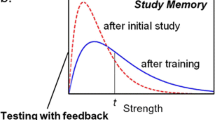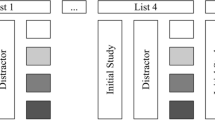Abstract
Testing initially learned information before presenting new information has been shown to counteract the deleterious effects of proactive interference by segregating competing sources of information. The present experiments were conducted to demonstrate that testing can also have its effects in part by integrating competing information. Variations of classic A–B, A–D paired-associate learning paradigms were employed that included two lists of word pairs and a cued-recall test. Repeated pairs appeared in both lists (A–B, A–B), control pairs appeared in List 2 only (A–B, C–D), and changed pairs appeared with the same cue in both lists but with different responses (A–B, A–D). The critical manipulation was whether pairs were tested or restudied in an interpolated phase that occurred between Lists 1 and 2. On a final cued-recall test, participants recalled List 2 responses and then indicated when they recollected that responses had earlier changed between lists. The change recollection measure indexed the extent to which competing responses were integrated during List 2. Change was recollected more often for tested than for restudied pairs. Proactive facilitation was obtained in cued recall when change was recollected, whereas proactive interference was obtained when change was not recollected. These results provide evidence that testing counteracted proactive interference in part by making List 1 responses more accessible during List 2, thus promoting integration and increasing later recollection of change. These results have theoretical implications because they show that testing can counteract proactive interference by integrating or segregating competing information.
Similar content being viewed by others
References
Anderson, M. C., & McCulloch, K. C. (1999). Integration as a general boundary condition on retrieval-induced forgetting. Journal of Experimental Psychology: Learning, Memory, and Cognition, 25, 608–629. doi:10.1037/0278-7393.25.3.608
Anderson, M. C., & Neely, J. H. (1996). Interference and inhibition in memory retrieval. In E. L. Bjork & R. A. Bjork (Eds.), Memory (Handbook of Perception and Cognition) (2nd ed., pp. 237–313). San Diego, CA: Academic Press.
Barnes, J. M., & Underwood, B. J. (1959). “Fate” of first-list associations in transfer theory. Journal of Experimental Psychology, 58, 97–105. doi:10.1037/h0047507
Butler, A. C. (2010). Repeated testing produces superior transfer of learning relative to repeated studying. Journal of Experimental Psychology: Learning, Memory, and Cognition, 36, 1118–1133. doi:10.1037/a0019902
Butler, A. C., Karpicke, J. D., & Roediger, H. L., III. (2008). Correcting a metacognitive error: Feedback increases retention of low-confidence correct responses. Journal of Experimental Psychology: Learning, Memory, and Cognition, 34, 918–928. doi:10.1037/0278-7393.34.4.918
Butler, A. C., & Roediger, H. L., III. (2008). Feedback enhances the positive effects and reduces the negative effects of multiple-choice testing. Memory & Cognition, 36, 604–616. doi:10.3758/MC.36.3.604
Carpenter, S. K. (2012). Testing enhances the transfer of learning. Current Directions in Psychological Science, 21, 279–283.
Chan, J. C. K., McDermott, K. B., & Roediger, H. L., III. (2006). Retrieval induced facilitation: Initially nontested material can benefit from prior testing of related material. Journal of Experimental Psychology: General, 135, 553–571. doi:10.1037/0096-3445.135.4.553
Crowder, R. G. (1976). Principles of learning and memory. Hillsdale, NJ: Erlbaum.
Darley, C. F., & Murdock, B. B., Jr. (1971). Effects of prior free recall testing on final recall and recognition. Journal of Experimental Psychology, 91, 66–73. doi:10.1037/h0031836
Hintzman, D. L. (2010). How does repetition affect memory? Evidence from judgments of recency. Memory & Cognition, 38, 102–115. doi:10.3758/MC.38.1.102
Jacoby, L. L. (1974). The role of mental contiguity in memory: Registration and retrieval effects. Journal of Verbal Learning and Verbal Behavior, 13, 483–496. doi:10.1016/S0022-5371(74)80001-0
Jacoby, L. L. (1991). A process dissociation framework: Separating automatic from intentional uses of memory. Journal of Memory and Language, 30, 513–541. doi:10.1016/0749-596X(91)90025-F
Jacoby, L. L. (1999). Ironic effects of repetition: Measuring age-related differences in memory. Journal of Experimental Psychology: Learning, Memory, and Cognition, 25, 3–22. doi:10.1037/0278-7393.25.1.3
Jacoby, L. L., & Wahlheim, C. N. (2013). On the importance of looking back: The role of recursive remindings in recency judgments and cued recall. Memory & Cognition, 41, 625–637. doi:10.3758/s13421-013-0298-5
Jacoby, L. L., & Wahlheim, C. N. (2014). Memory consequences of looking back: Noticing and recollecting change. Manuscript submitted for publication.
Jacoby, L. L., Wahlheim, C. N., & Coane, J. H. (2010). Test-enhanced learning of natural concepts: Effects on recognition memory, classification, and metacognition. Journal of Experimental Psychology: Learning, Memory, and Cognition, 36, 1441–1451.
Jacoby, L. L., Wahlheim, C. N., & Yonelinas, A. P. (2013). The role of detection and recollection of change in list discrimination. Memory & Cognition, 41, 638–649. doi:10.3758/s13421-013-0313-x
Jang, Y., & Huber, D. E. (2008). Context retrieval and context change in free recall: Recalling from long-term memory drives list isolation. Journal of Experimental Psychology: Learning, Memory, and Cognition, 34, 112–127. doi:10.1037/0278-7393.34.1.112
Kang, S. H. K., McDaniel, M. A., & Pashler, H. (2011). Effects of testing on learning functions. Psychonomic Bulletin & Review, 18, 998–1005. doi:10.3758/s13423-011-0113-x
Karpicke, J. D., & Roediger, H. L., III. (2007). Expanding retrieval practice promotes short-term retention, but equally spaced retrieval enhances long-term retention. Journal of Experimental Psychology: Learning, Memory, and Cognition, 33, 704–719. doi:10.1037/0278-7393.33.4.704
McDaniel, M. A., & Fisher, R. P. (1991). Tests and test feedback as learning sources. Contemporary Educational Psychology, 16, 192–201.
Nelson, S. M., Arnold, K. M., Gilmore, A. W., & McDermott, K. B. (2013). Neural signatures of test-potentiated learning in parietal cortex. Journal of Neuroscience, 33, 11754–11762.
Nelson, D. L., McEvoy, C. L., & Schreiber, T. A. (1998). The University of South Florida word association, rhyme, and word fragment norms [Database]. Retrieved from http://w3.usf.edu/FreeAssociation/
Nunes, L. D., & Weinstein, Y. (2012). Testing improves true recall and protects against the build-up of proactive interference without increasing false recall. Memory, 20, 138–154.
Otero, J., & Kintsch, W. (1992). Failures to detect contradictions in a text: What readers believe versus what they read. Psychological Science, 3, 229–235. doi:10.1111/j.1467-9280.1992.tb00034.x
Pastötter, B., Schicker, S., Niedernhuber, J., & Bäuml, K.-H. T. (2011). Retrieval during learning facilitates subsequent memory encoding. Journal of Experimental Psychology: Learning, Memory, and Cognition, 37, 287–297. doi:10.1037/a0021801
Postman, L., & Underwood, B. J. (1973). Critical issues in interference theory. Memory & Cognition, 1, 19–40.
Putnam, A. L., Wahlheim, C. N., & Jacoby, L. L. (2014). Memory for flip-flopping: Detection and recollection of political contradictions. Memory & Cognition. doi:10.3758/s13421-014-0419-9
Radvansky, G. A., & Zacks, R. T. (1991). Mental models and the fan effect. Journal of Experimental Psychology: Learning, Memory, and Cognition, 17, 940–953. doi:10.1037/0278-7393.17.5.940
Roediger, H. L., III, & Butler, A. C. (2011). The critical role of retrieval practice in long-term retention. Trends in Cognitive Sciences, 15, 20–27. doi:10.1016/j.tics.2010.09.003
Roediger, H. L., III, & Karpicke, J. D. (2006a). The power of testing memory: Basic research and implications for educational practice. Perspectives on Psychological Science, 1, 181–210. doi:10.1111/j.1745-6916.2006.00012.x
Roediger, H. L., III, & Karpicke, J. D. (2006b). Test-enhanced learning: Taking memory tests improves long-term retention. Psychological Science, 17, 249–255. doi:10.1111/j.1467-9280.2006.01693.x
Szpunar, K. K., McDermott, K. B., & Roediger, H. L., III. (2008). Testing during study insulates against the buildup of proactive interference. Journal of Experimental Psychology: Learning, Memory, and Cognition, 34, 1392–1399. doi:10.1037/a0013082
Tulving, E., & Watkins, M. J. (1974). On negative transfer: Effects of testing one list on the recall of another. Journal of Verbal Learning and Verbal Behavior, 13, 181–193. doi:10.1016/S0022-5371(74)80043-5
Tzeng, O. J., & Cotton, B. (1980). A study-phase retrieval model of temporal coding. Journal of Experimental Psychology: Human Learning and Memory, 6, 705–716. doi:10.1037/0278-7393.6.6.705
Underwood, B. J., & Ekstrand, B. R. (1967). Studies of distributed practice: XXIV. Differentiation and proactive inhibition. Journal of Experimental Psychology, 74, 574–580.
Wahlheim, C. N. (2014). Proactive effects of memory in young and older adults: The role of change recollection. Memory & Cognition, 42, 950–964. doi:10.3758/s13421-014-0411-4
Wahlheim, C. N., & Jacoby, L. L. (2013). Remembering change: The critical role of recursive remindings in proactive effects of memory. Memory & Cognition, 41, 1–15. doi:10.3758/s13421-012-0246-9
Wahlheim, C. N., Maddox, G. B., & Jacoby, L. L. (2014). The role of reminding in the effects of spaced repetitions on cued recall: Sufficient but not necessary. Journal of Experimental Psychology: Learning, Memory, and Cognition, 40, 94–105. doi:10.1037/a0034055
Wegner, D. M. (1994). Ironic processes of mental control. Psychological Review, 101, 34–52. doi:10.1037/0033-295X.101.1.34
Weinstein, Y., Gilmore, A. W., Szpunar, K. K., & McDermott, K. B. (2014). The role of test expectancy in the build-up of proactive interference in long-term memory. Journal of Experimental Psychology: Learning, Memory, and Cognition, 40, 1039–1048. doi:10.1037/a0036164
Winograd, E., & Soloway, R. M. (1985). Reminding as a basis for temporal judgments. Journal of Experimental Psychology: Learning, Memory, and Cognition, 11, 262–271. doi:10.1037/0278-7393.11.2.262
Wissman, K. T., Rawson, K. A., & Pyc, M. A. (2011). The interim test effect: Testing prior material can facilitate the learning of new material. Psychonomic Bulletin & Review, 18, 1140–1147. doi:10.3758/s13423-011-0140-7
Author Note
This research was supported by a Collaborative Activity Award from the James S. McDonnell Foundation awarded to Larry Jacoby, and by Grant No. 5T32AG000030-38 from the National Institute on Aging. Thanks to Larry Jacoby for his substantial contributions to the ideas presented here, Ashley Bartels for her assistance with manuscript preparation and data collection, and Heather Bartels and Kara Golebiowski for their assistance with data collection.
Author information
Authors and Affiliations
Corresponding author
Rights and permissions
About this article
Cite this article
Wahlheim, C.N. Testing can counteract proactive interference by integrating competing information. Mem Cogn 43, 27–38 (2015). https://doi.org/10.3758/s13421-014-0455-5
Published:
Issue Date:
DOI: https://doi.org/10.3758/s13421-014-0455-5




